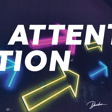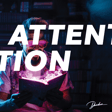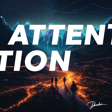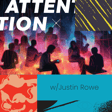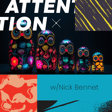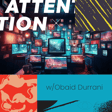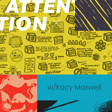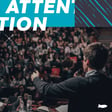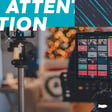Become a Creator today!Start creating today - Share your story with the world!
Start for free
00:00:00
00:00:01

Audience Growth As Modern Public Relations w/Cassidy Shield
In this episode, Dan Sanchez talks to Cassidy Shield who is the SVP Marketing and Sales of at Narrative Science.
In this episode we cover:
What you can expect with traditional media
What Narrative Science with a combo of paid ads, events, and organic social to build an audience
How owned media led to more earned media
In this episode we cover:
What you can expect with traditional media
What Narrative Science with a combo of paid ads, events, and organic social to build an audience
How owned media led to more earned media
Transcript
Introduction to the Attention Podcast
00:00:09
Speaker
Welcome back to the Attention podcast. I'm Dan Sanchez with Sweetfish, and today I'm here with Cassidy Shield, who is the SVP of Marketing and Sales at Narrative Science. Cassidy, welcome to the show. Thanks, Dan. Pleasure to be here. Looking forward
Is Traditional PR Still Relevant?
00:00:23
Speaker
to it. Today, we're going to be talking about how audience development is the modern PR strategy. And to kick it off, Cassidy, I want to start with this one question. In a digital age, is traditional PR still effective? Is it even still relevant today?
00:00:39
Speaker
I think it depends on what company you're in and kind of the life cycle of that company. I do think in specific instances, PR is still valuable. But on the other hand, I would say for 95% of the least B2B companies out there, it's not. And we can get into why I think that. But only in slight cases have I seen it actually valuable to an organization. And for most of us, I would say the answer is no.
Who Benefits from PR?
00:01:08
Speaker
Before we dive into what the 95% should be doing, who's in that 5% real quick so we can get the rest to self-select out of that? Who's in that 5? I think you're going to have large companies who are market leaders who need
00:01:25
Speaker
And we're going to have a big PR team and a heavy strategy. So I'll give an example. I was at Narrative Science. We got acquired by Salesforce and Tableau. Of course, Salesforce and Tableau have a PR team. And as well, they should because they're doing a lot of, having a lot of impact on the world. And so that makes a lot of sense. But the most of us, the folks listening in my time at Narrative Science, we're in a small company trying to
00:01:50
Speaker
drive change. And as cool as we think our stories are, they're not really for mass consumption, which is how I would have to think about PR strategy is like, are you really changing the world? Do you have proof points of that? Is it a story that kind of resonates across
00:02:10
Speaker
demographics and segments, and for most of us, the answer is no. So essentially, you have to be a big company. In general, what's the big company size? Are we talking unicorn and up? Or is it 100 million and up? Generally, we're throwing this huge ballpark.
00:02:28
Speaker
two dimensions, I would say yes, you have to be a company that's a marketer category leader, or you're at the size where, you know, for whatever reason, you're on your fifth or sixth channel, and PR is now one of them, and that's an important thing to you. Or
00:02:43
Speaker
there are going to be companies where what you're doing may impact and change in how we perceive something that all of us care about. Think of that as education, energy, healthcare, etc. There could be instances where if that's what you're doing and you try to drive a fundamental change in how we see the world in five or six different categories that maybe it is important for you to be out there or you're a consumer-oriented brand and you're a consumer-oriented brand, you need to drive
00:03:12
Speaker
kind of awareness in the consumer market, but most of us aren't that. Okay. I'm sure we have a few people listening that are like, well, but I want to be the category definer. So does that mean I should start with PR?
Challenges of Traditional PR
00:03:24
Speaker
You know, they just raised their first round. They're like, we're going to change the industry. Cause I think a lot of people are thinking that, but like, is PR the way to break through then to get there? Yeah. I mean.
00:03:35
Speaker
Let's outline what that actually looks like, the status quo, because we face this question at narrative science. So you're going to go off and you're going to find an agency. I would say for an agency kind of worth its salt, you're going to spend 15 grand a month at the minimum, likely higher than that to get the attention of the heavy hitters. You're going to need something to say that's relevant for a pretty big audience.
00:04:01
Speaker
you're gonna have to spend time building relationships. So while your PR agency may have relationships, you likely don't as a company. This means you'll spend three to four to five months getting the agency up to speed on your story and working out your story and finding your proof points. You're gonna just need to start with, let's call it second or third tier media and get your feet wet with the story before you get to what you really want, which is, you know, Wired, New York Times, et cetera, et cetera.
00:04:29
Speaker
which rarely happens. What you're in for is a road that probably takes 18 months to two years at 15 to 20 grand a month. Your output tangibly is going to be maybe a story a quarter in a tier two or tier three publication until you get lucky.
00:04:51
Speaker
And it's going to require a lot of time from your CEO, your head of marketing to do that. And so when you look at kind of that reality versus the effort you need to put into it, you got to ask yourself, you just got to be brutally honest with yourself. And that is why would I want to do that?
00:05:09
Speaker
Oh my goodness. I don't think I've ever looked at it that way. I mean, you're talking like 45 grand an article. Just to me, I'm thinking about all the things I could spend money on for 45 grand. And you think about, you get yourself in an article and then you say, okay, who came to my site? I'm going to see this bounce in traffic to my site. And it's not even a blip on the radar.
00:05:36
Speaker
And then you go find out like these, these outlets, these media outlets, even, you know, the second, it's like a second or third tier outlet. They're pumping out so much content every day. You're like one article in maybe 10 or 15 things being put out a day. And the readership of that is actually ends up being quite low. And number of people who read it, they check you out is almost for all practical purposes is zero. I maintain even when you hit one of the tier one publications, you should ask yourself like,
00:06:06
Speaker
Does that really actually move the needle? And I wouldn't be surprised if the answer is actually no. Even though it makes you feel good, your investors love you. The CEO's like, I'm so proud. I was in his tier one media publication. The board's patting them on the back. Your investors are happy. Your employees are happy.
00:06:25
Speaker
And in some cases, if that's the reason you're doing PR is to make your stakeholders happy, then okay, but that's a pretty expensive proposition to make all those folks happy when the reality is not moving the needle on your business. I mean, I'd be happy if I got mentioned any one of those publications and it would be like a moment, but at 45 grand a pop, I don't know if I'd be so happy.
00:06:49
Speaker
So you guys did a test with this. Is this what you
Narrative Science's PR Journey
00:06:52
Speaker
found? I know you did a test early on in narrative science when you first started your journey there. Is that kind of what you saw? Did you get mentioned in any media or did you spend a lot of money for a couple of months and it just, you didn't get anything?
00:07:04
Speaker
Yeah, think of this in two ways. The company started 10 years ago and well before I showed up, I was there for the last three years. Early in the company's history, PR was an effective strategy. The reason it was effective was it was a very different world back then versus the world we're in today. That's one. And two, the company did pioneering, had a pioneering kind of tech story, which was basically machines are going to generate content instead of people.
00:07:34
Speaker
So they have the story, which was fairly provocative and universal in that your media outlets will be creating stories generated by AI, not by humans. And so they got a lot of PR coverage and that was great for the company back in its early days. And in that case, if you have one of those stories,
00:07:52
Speaker
And at that point in time when there's not as much choice for readership, it worked very effectively. Now, a couple of pivots later, we have to evaluate that situation in the last couple of years. Now, it's logical that the CEO would be like, why wouldn't we use PR again?
00:08:09
Speaker
And so we did that test. We hired an agency. We're at it for six to nine months. We got put into some publications. Now our story changed. It was a little bit more narrow. It was about disruption in the analytics market. And while we think that's profound and interesting, it's not that profound and interesting to the vast majority of people out there. And in fact, the only people we really want it to be interesting to are the people we want to sell to.
00:08:34
Speaker
And so a lot of what I articulated was because of the experience we went through. We gave it a shot. We tested it. Can't blame us on the agency. They did their job, but the results just weren't there. And so we shut it off.
00:08:49
Speaker
Now that was a hypothesis that it wouldn't generate results, but we put an effort into trying to make that happen to see if we can disprove that hypothesis. And you know, the reality is, uh, it was proven accurate. So once that didn't quite work out, what did you guys do afterwards? Yeah.
Building Community Through Content
00:09:06
Speaker
So very similar to like what I think you're, the purpose of this podcast was is we want to take, uh, creating awareness and building an audience into our own hands. You know, if you think about.
00:09:19
Speaker
that world of using PR, you're kind of beholden to the agency helping you build an audience. You don't have that control. And so what we said is, listen, how can we do that? We want to build an audience with data and analytics leaders. Why can't we do that ourselves? And that was the strategy we set forth in terms of kind of building our own community based on content where we would engage directly with the audience of folks that we want to engage with
00:09:49
Speaker
provide value to them, build relationships with them, i.e. create awareness of who we are. We didn't sell to this community, but if they needed something that we could do, they will figure out how to get to us, it was our philosophy. But before somebody buys something from you, they need to be aware of you. And that was kind of the whole genesis around our strategy and building kind of a community, a content-based community.
00:10:15
Speaker
So I'm sure at that time, you guys probably were already producing some owned media pieces. You probably had a blog and we're posting there. We're probably posting it to social media. It's three years ago, right? So these were kind of normal things most companies, probably narrative science was doing. What kind of shift did you make in order to be like, no, we want to do this more intentionally? Like what kind of channels did you look at? And what did you look at as far as like how you approach those channels differently than you had been before? Yeah, we were doing,
00:10:44
Speaker
When I first showed up and even the first year I was there, we're doing the classic thing that everybody does. We had a blog, we wrote articles, we thought they were interesting. We actually wrote them.
00:10:54
Speaker
you know, one degree removed from what we did as a company. We thought they were independent, but they really weren't. It was just more of like a product pitch. We put those out on our own organic channels and we'd get them to the sales team and they can push it out to our customers and like nobody read them. And that's where I think most of us, most of, yeah, the industry is. So we knew we needed to kind of figure out a new way. Interestingly enough, this was around the same time that COVID hit.
00:11:25
Speaker
And so we did two things that kind of jumpstart this. We wrote our own book, stole this idea from Drift. We wrote our own book, and that book was basically how to tell stories. So for a company to train their employees how to be data storytellers, or how to be storytellers, not data storytellers, just storytellers. And it was all about
00:11:48
Speaker
letting your people be people. That was the name of the book. So we created that. It's kind of a way to kind of get started. We gave that away, hardback, electronic, to all our customers and anybody else who wanted it. We went out and we promoted that and so forth. That was kind
Adapting to COVID: Virtual Events
00:12:03
Speaker
of step one. The second thing that happened was obviously COVID through our marketing strategy up in the air like everybody else. And around that time, we're
00:12:16
Speaker
going through creating kind of defining what this kind of category is we want to create, that we are going to disrupt the analytics market with. And what we decided was, let's try to throw our own event, invite people interested in this topic, to come hear from other experts in the industry. And this was around data storytelling. And we ended up throwing our first event
00:12:40
Speaker
four to six weeks after COVID hit. And when we set out, we didn't know how to do that. We didn't know who was going to show up. We're like maybe 500 people show up, maybe 1,000, and we end up getting 4,000. And we got a lot of great feedback, which was, thanks for putting this together. I learned a lot. Now, we weren't promoting what we did at all in this show.
00:13:03
Speaker
in this event. It was all about the community and giving back to them. And so we kind of lucked into that. If you think about that strategy now, it may not work just because we're kind of fatigued with online events. But at that time, everybody was looking for a way to kind of interact with each other when you couldn't do it face to face. And so we took that strategy and we multiple, you know, we did it three more times for various targeted audiences, all with the idea of expanding
00:13:31
Speaker
our community by creating a place that people could congregate, that we could create content that we could share back with the community and build our newsletter and distribution lists and so forth and so on. And so that just transformed our thinking around how we would go about doing this because we saw some success. Obviously, we launched a podcast with the help of Sweetfish as another avenue. And in that podcast, it was very simple. We want to hear from people driving change with data, so let's go interview them.
00:14:01
Speaker
And then let's make them the hero that share their stories without others in the community and so forth and so on. And so as we started doing these, we're building awareness, we're building an audience. And the idea would be if we can provide the value for this audience once so we can, and this is our way to participate in the community, good things will happen.
00:14:24
Speaker
So you have virtual events going. You have a podcast.
Strategies for Community Engagement
00:14:27
Speaker
What are some of the things you do to grow the audience from event to event and episode to episode in order to kind of get a rising, I don't know, to see that the audience grow larger and larger over time. We did most of this.
00:14:42
Speaker
organically with select paid channels. And so what I mean by that is two things. On the event side, we'd have a small budget to kind of goose attendance on paid social, LinkedIn, Facebook. We had kind of a separate strategy of kind of building awareness on those channels that wasn't content driven. And we augmented that with a content driven approach to kind of building community awareness. And that would be attracting people to the events. So it's kind of one strategy.
00:15:13
Speaker
largely organic, augmented with paid social. Over time, as we created content, we would turn that content back into, it's called e-books and other things that would be valuable. And we would pump that back through the same strategy. That strategy would be predominantly organic as we build our following, but we'd augment that as well with kind of a paid social strategy to kind of just bring in new people
00:15:41
Speaker
into the community who may not be aware. And so this idea of kind of effectively juicing your content and community with paid amplification is something that we didn't spend the bulk of our money on, but we did it enough to kind of provide value and kind of juice like the growing in those communities, if that makes any sense.
00:16:00
Speaker
No, it's a really interesting model. Essentially, you got paid on the front end, big event that produces all of your long form content, and then you take that long form content, slice it and dice it up into different content that's contextual to all the different social platforms. Is that about right?
00:16:19
Speaker
That's about right. Majority of that we try to do organically because we didn't have a lot of money, but we would selectively put money behind certain things that we saw that were performing well to amplify it. Did you use the organic stuff you were posting to build momentum for the next event, or did you just let that trickle out to further the message? I would like to think that we were smart enough to do it event to event, but it was largely the latter of just
00:16:50
Speaker
keeping the storyline going and the engagement going with something interesting to say, it's something helpful to the community that wasn't like by our product. We made a few mistakes along the way that like in hindsight, when we look back, we probably would have did it much more how you would ask the question, Dan, which was, can we do this more systematically event to event? But you know, you live and learn these things as you go.
00:17:16
Speaker
It's an interesting approach doing the event, which I'm not a huge fan of live events just because I think I'm so used to podcasting and being able to edit stuff out and clean up my own audio and the silly words that I'm injecting or when I'm repeating things over and over again and it just can be cleaned up. But there is a power to it. It becomes, at least I feel like it's a bit of a forcing function. I imagine, like I did a webinar like a week, week and a half ago on audience growth. And I knew I'm like,
00:17:44
Speaker
As much as I'll promote it on organic, and we promote it a lot, I think 100 people registered, 50 plus people showed up, which was a pretty good rate of people who showed up who registered. Ultimately, I'm like, this is going to force me to think through the content, record it, and now I have a recording that I can slice and dice up afterwards. It's almost like any attention you get in it is sprinkles on the cake. The cake is the content.
00:18:12
Speaker
and what you can do with it later for all your organic promotion. Because coming up with the content is the hard part, but it can be useful for that. Would you think that would be worthwhile if people are like, I don't know how many people I can get to register that it'd be worthwhile putting together maybe a couple of subject matter experts and doing a quick workshop with some live troubles, helping their customers figure things out live on the call just for the content alone?
00:18:36
Speaker
Yeah, I mean, this is how we actually, this is the part we, I think, did pretty well. We went into the event setting up the format to reuse the content in the future. And that could be how we moderate a panel. That could be me one-on-one interviewing somebody at the event that we would then use
00:18:55
Speaker
on social cut up, but also back in as a future episode on the podcast for those people who weren't at the event. And so we actually went into the event with the idea that this wasn't about the event. It was about, to your point, the content and how do we use it and carry it forth beyond the event.
00:19:15
Speaker
And so that's a bit, I think we did well. So yes, we wanted people to be there in the event because you want your speakers and your guests to not be having a conversation with nobody listening. For sure. For sure. You got to get, you got to take the best wing you can take, right? Otherwise it's, it's, you might as well just be showing up to a studio and just recording, but yeah. And you love the interaction with the audience, which you have and so forth. And so on, but the real value to your point was like the content and what you did with it afterwards.
00:19:42
Speaker
Did you find you got good traction with the guests you invited to come and speak and them sharing it later with their audiences? I would call, to be honest, it was mixed. I think the people who are comfortable doing that already, absolutely. I remember one of our first few events, we invited some big brands like Drift to come speak and others, and they did an amazing job at promotion ahead of the event and after the event.
00:20:09
Speaker
And then others, which is kind of the beauty of this from an authentic perspective, they weren't professional speakers. So like some people just don't have an audience after the fact, but they have something really interesting to say. So we took that upon ourselves to be the ones promoting that content for those guests. So there's a little bit of both.
00:20:27
Speaker
well-versed in putting out their own content and promoting things they did, they absolutely used it and did a great job. If they weren't, then that's where we would help do it for them. It's about my experience as well with being a podcast host. Some guests promote, some don't. As much as you can slice and dice it and pre-write the tweets and graphics for them, it's like, some don't need it, some don't care. Some are just happy to be a guest. How did it help doing all these things
00:20:55
Speaker
Essentially, growing an audience with the events and with the podcast, how do you bring brand awareness to narrative science? What were some of the things that you had planned for and was there anything shocking after you did it that was just surprising to you?
Community Feedback and Recognition
00:21:08
Speaker
First of all, this coincided with the strategy we built, which was all inbound.
00:21:17
Speaker
And so we relied on kind of demand pipeline generation to come from marketing. So obviously we needed, this helped us kind of build that awareness and then as much as other things that we did. But I think it's the subtle things that you hear, like the more people I meet in the community who may have not shown up in an event or who I've never met, and they like know who we are. And they knew what we stood for.
00:21:43
Speaker
And they would say, hey, I listened to this great podcast. I saw this video on LinkedIn. Or you guys are all over the place on LinkedIn. We'd hear that all the time. And we're a company that has 80 people. And we're hearing that from the audience that we care about that matters to us, playing that back.
00:22:04
Speaker
And so when you hear those things, you're like, all right, well, maybe I can't measure that in a system. Maybe I can't directly attribute that to revenue. But I can feel like the things that we're doing are creating value for others and building awareness of who we are.
00:22:19
Speaker
Do you ask people as they come inbound and schedule demos and different things, or you just talk to them as they're onboarding, do they mention things like, oh yeah, I listened to the podcast. Oh yeah, I went to a virtual event. They're probably mentioning it a lot, I'd imagine. They do. We've trained our sales team to ask those questions and we would record them and gone. Back when we're running events, we would hear about
00:22:40
Speaker
They saw it, they came to one of our events. That's where they learned. We've heard about the podcast. They've heard about, we've seen you guys on social. Sometimes it's like, I got a, we got a paid ad on Instagram. That's how we found you. But all the things that you're doing, all the different things that we're doing, we've heard from inbound prospects coming in, the success of those things. And so that's good to hear. Like, um, that's what you'd expect.
00:23:06
Speaker
And that's, we really, we really put more weight into that than we would put into like, what is Google analytics telling us or what does Marketo tell us as far as the source gives. For sure. I like Google analytics and we use HubSpot. So what HubSpot tells us, but at the end of the day, like the self-reported, where did you hear about us from is just so much, so much better. I know we use that at Sweetfish and it's amazing. People are like, oh yeah, first found out about you guys on LinkedIn. And, you know, and then we became a podcast subscriber or something like that. You kind of kind of see the journey over and over again.
00:23:36
Speaker
Dan, maybe you're about ready to ask a question, but maybe if I just take this back to our comparison to PR.
Owned Media vs. Traditional PR
00:23:42
Speaker
Absolutely. We ran four events. We had 10,000 to 12,000 people register for the events. We have 70 episodes of the podcast and tens of thousands of listens.
00:23:56
Speaker
We have a newsletter of 10,000 or 12,000 people on it that we take our content and put back out to it. We have all this content on LinkedIn that you talked about repurposing and putting out. So we've grown our audiences on those platforms and our engagement. I know it's very important here, not just to size the audience, but the engagement on these channels has grown dramatically. And so if you look at all that, and how much did we spend to do that? Substantially less than $15,000.
00:24:24
Speaker
a month. And you go compare that to where we would have been over the last few years in PR, we may have gotten seven articles published. And maybe if we're lucky, we're one of the 5% or 10%, we might have landed after two years at tier one publication. And we would have spent whatever, $15,000 a month times two years. And you look at that comparison, and you're like, what would you rather have?
00:24:50
Speaker
It's a stark difference. It's dramatic. That's really what I'm saying here when I think of what you're trying to promote around building an audience and all the modern ways of doing that versus
00:25:04
Speaker
the old way we used to think about doing this. So your media impressions just through owned media alone are probably through the roof compared to what you would have gotten in earned media with the PR agency. But I want to know how did it even affect, you're getting earned media as a result. I know you've been a guest on B2B Growth, you're a guest on this show now. You've probably been a guest on a lot of other podcasts and have probably gotten media mentioned somewhere out there from things that aren't your own media. They're other people's media. How has that been impacted by all the stuff that you're doing with owned?
Long-term Relationships Over Immediate Sales
00:25:34
Speaker
You know, I'm going to surprise you a little bit as a person who's like analytical and that is, I don't even measure it because I know it'll work. And so, you know, part of our strategy is taking our people and I'm one of them and just going out there and providing value.
00:25:51
Speaker
once in a while telling our story, but you know how we want this to work. People watch this. They're like, who's this guy Dan talked to? What's this company? They look us up. They file that away in the back of their head and they say, well, listen, if that seems interesting, if I ever need something like that, maybe I'll look this company up. What we've noticed is based on the interactions we've had and the people we've met that
00:26:16
Speaker
that's working. Now, it may take a while for that to translate into revenue and maybe it never does. But awareness isn't about just selling to the people who want to buy your stuff now. It's about building relationships with people for the future. And that's the belief and it's kind of a take the long game towards doing that. Do you think you might have earned more earned media attention from the stuff you're doing with owned media than you would have gotten the more traditional route?
00:26:42
Speaker
Absolutely. And you can think of this in two ways. There's the kind of classic way of kind of measuring this and kind of audience size.
00:26:51
Speaker
But I don't think that does it justice. Because if you think about what does it look like in the old world, it's like somebody read an article or clicked on a link. They may or may not read it. And you never know. To this world, which is, I just listened to this guy for 45 minutes on a podcast. Or I went to an event and I spent three hours at one of their events. Or I follow and read what this company or this person posts on LinkedIn every day.
00:27:20
Speaker
So one, you can't try to measure that in its totality. It's even harder to take into account the length of engagement with that content versus what you would see in kind of your traditional channels. And so if you were to somehow measure that together, I think you would see 50x improvement.
00:27:40
Speaker
Good night. Maybe even higher. I mean, you guys have done exceptionally well. I remember it was from your events, I believe you invited James to speak in an event and I found out about it. And of course we probably had you on B2B growth not long afterwards and then a relationship was built. I'm sure we've had a number of interactions and content collaborations since then, but it's because you had the event that Sweetfish became aware of you. So, and it's been fun. I'm sure it's happened to a lot of people where,
00:28:07
Speaker
they were guests or they found out about you through those events and then start to learn and grow more familiar with what you actually do because you came for the event. But then you start to go down the funnel because people aren't, I don't know, people are smart. They kind of figure out like, oh, who's putting this on? What's going on? So it's clearly working.
00:28:27
Speaker
It kind of works both directions. Like James, I remember that session. He absolutely crushed it. It was like one of the best sessions we had at that event. But along the way, we get to know James, and we get to know what your company's about. And he did a favor for us to be at that event. So the relationship's to the point where that's what you want out of these interactions. So if I need some Swedish media in the future, I call James. Because we have that relationship, and that's what you're trying to do both ways.
00:28:54
Speaker
building a modern community is you figure out a level of trust and kind of familiarity with the people you're engaging with and sometimes that will translate into businesses and sometimes it won't but like that's all why we're doing this.
00:29:09
Speaker
There's a whole other element of community building when it comes to audience growth. I don't know if you necessarily have to build a community in order to build an audience. It's possible, but it sure is a heck of a lot more fun and rewarding and I'd say would accelerate audience growth, actually build community and relationships with the people that you're working with.
00:29:27
Speaker
they helping you, you helping them, it just, it goes a little bit much farther. But that's another topic for another episode. Is there anything I left on the table that you'd like to add to this audience growth as a new way to do modern PR?
Audience vs. Community: What's the Difference?
00:29:41
Speaker
It's a good question. I will say people sometimes get tripped up on this idea of am I building an audience with people who use my product or am I building an audience with people just in the
00:29:54
Speaker
market or industry that I'm interested in. And both are effective, but you should think of these strategies as very different. This is a company I'm in today, Salesforce and Tableau, amazing communities, largely a bit built around people who've been successful using their product. That's a great strategy. Everybody would love to be in that position.
00:30:17
Speaker
But as an 80-person startup, that community would be very small. And so for us, our decision was we wanted to participate in the larger community beyond the people who use our product. How can we provide value to those folks? And what are the things that we could do from a way to step into those communities and be a part of it? And that's how we thought about it. What's the value we can bring?
00:30:42
Speaker
I feel like that's just a modern way that every startup or every small company or venture should be thinking about their marketing and their awareness and their brand building strategy. Well, Cassidy, thank you so much for joining me on the Attention Podcast. Where can people go to learn more about you and narrative science online if they want to learn more? You can find me on LinkedIn, Cassidy Shield. I'm out there every day. If you want to learn more about narrative science, you can go to narrativescience.com. Fantastic. Thanks again for joining me today. Thanks, Dan. Appreciate it.


